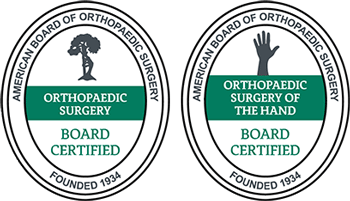Does Cracking Your Knuckles Cause Arthritis?
For decades, the act of cracking knuckles has been a subject of lively debate, accompanied by warnings from concerned individuals about its supposed link to arthritis and other potential health risks. While the satisfying “pop” sound might be off-putting to some, the Hand and Wrist Institute, a leading authority in hand and wrist health, seeks to dispel the long-standing misconception surrounding knuckle cracking and its alleged association with arthritis or carpal tunnel.
In this article, we explore the truth behind this popular belief. By examining the science and evidence surrounding knuckle cracking, we aim to shed light on whether there is a genuine cause for concern or if it’s simply an unfounded myth.
What Exactly Is Knuckle Cracking?
Knuckle cracking, also known as joint popping or cavitation, is the act of intentionally or unintentionally causing a cracking sound by manipulating the knuckles in the fingers. It’s a common habit that many people engage in, often as a form of self-adjustment or to relieve tension or stiffness in the fingers.
When you crack your knuckles, you apply force to the joint, which temporarily separates the bones slightly. This separation creates a change in pressure within the joint cavity, leading to the formation and collapse of gas bubbles within the synovial fluid that lubricates the joint. The rapid collapse of these bubbles creates the characteristic cracking sound.
Can Anyone Crack Their Knuckles?
Not everyone can crack their knuckles. Some people naturally have more joint mobility or are more prone to joint cracking their knuckles than others. Some may not be able to crack them at all, even if they try. While the reasons why some individuals can crack their knuckles and others can’t aren’t completely clear, it may be related to differences in joint structure, joint flexibility, or the presence of certain anatomical features that facilitate the release of gas bubbles.
Personal habits, such as intentionally manipulating the joints or applying pressure in specific ways, may also play a role. It’s important to note that cracking knuckles is a personal choice and isn’t necessary for joint health. If you cannot crack your knuckles or prefer not to do so, there’s no need to be concerned.
Can Cracking My Knuckles Regularly Lead to Potential Health Complications?
Contrary to popular belief, knuckle cracking doesn’t cause arthritis, joint damage, or carpal tunnel. We explore the science behind each of the below symptoms in more detail:
Knuckle Cracking and Arthritis
While some early studies suggested a potential association between knuckle cracking and an increased risk of osteoarthritis, more recent and robust research hasn’t found a clear link. The current consensus is that habitual knuckle cracking doesn’t appear to be a direct cause of osteoarthritis, joint degeneration, or long-term harm to the joints. It’s certainly not linked to rheumatoid arthritis, which is caused when your immune system attacks your joints. However, excessive or forceful knuckle cracking may occasionally lead to minor swelling, ligament laxity, or discomfort in the surrounding tissues.
The repetitive motion of knuckle cracking eventually wears down the joints and their protective cushioning. This means that if you already have osteoarthritis, which is caused by the breakdown of cartilage in the joints, knuckle cracking can make your symptoms worse. It’s worth noting that while knuckle cracking itself may not be particularly harmful, it can be an annoyance to those around you and may contribute to joint stiffness over time. Additionally, forcefully and excessively cracking your knuckles may cause strain on the ligaments and surrounding tissues, which could potentially lead to discomfort or injury.
Knuckle Cracking and Carpal Tunnel Syndrome
There’s no direct link between knuckle cracking and the development of carpal tunnel syndrome, which is characterized by the contraction of the median nerve as it goes through the carpal tunnel located in the wrist. It typically causes symptoms such as numbness, tingling, pain, and weakness in the hand and fingers. The causes of carpal tunnel syndrome are generally related to factors such as repetitive hand and wrist movements, prolonged and improper wrist positioning, underlying medical conditions (such as diabetes or rheumatoid arthritis), hormonal changes, and genetic predisposition.
Knuckle cracking doesn’t involve the structures or mechanics associated with carpal tunnel syndrome. However, it’s worth mentioning that habitual or forceful knuckle cracking may occasionally cause strain or irritation to the ligaments, tendons, or soft tissues surrounding the wrist or hand. In some cases, this strain could lead to discomfort or inflammation in the area. If this persists or is severe, this inflammation might potentially contribute to symptoms that mimic or worsen carpal tunnel syndrome. However, this would be more of an indirect association and not a direct cause-and-effect relationship.
Knuckle Cracking and Ligament and Tendon Damage
Forceful or excessive knuckle cracking may occasionally cause strain or irritation to the ligaments, tendons, or soft tissues surrounding the joints. This could potentially lead to discomfort or inflammation in the area. Some research suggests that knuckle cracking might temporarily reduce grip strength immediately after the cracking occurs. However, it’s unclear whether this effect has any long-term implications or functional impact.
Can Cracking My Knuckles Provide Relief?
Knuckle cracking has been reported to provide temporary relief for joint stiffness, stress, or tension, but this relief is usually short-lived. However, it’s important to note that relying solely on knuckle cracking for joint mobility without addressing the potential underlying causes or implementing appropriate stretching and strengthening exercises may not be a comprehensive or sustainable solution.
It’s worth mentioning that osteoarthritis, carpal tunnel syndrome, and other hand and wrist conditions can be influenced by various factors, including age, genetics, joint overuse, previous injuries, and obesity. If you have concerns about your joint health or are experiencing symptoms or pain, you should consult with a healthcare professional, such as a rheumatologist or orthopedic specialist.
Is Cracking Knuckles Safe?
While there’s no clear consensus on the long-term health effects of knuckle cracking, it’s generally advisable to practice moderation and avoid forceful or excessive cracking. If you have concerns about your joint health or are experiencing symptoms of osteoarthritis, carpal tunnel syndrome, or joint pain, we advise you to consult with a healthcare professional, such as our hand and wrist surgeons in Dallas, Texas. We can evaluate your symptoms, perform diagnostic tests, and provide the appropriate guidance and treatment options for maintaining healthy joints and managing any underlying conditions. Contact us today to make an appointment with our specialists.
person holding persons hand by Dan Burton is licensed with Unsplash License


























